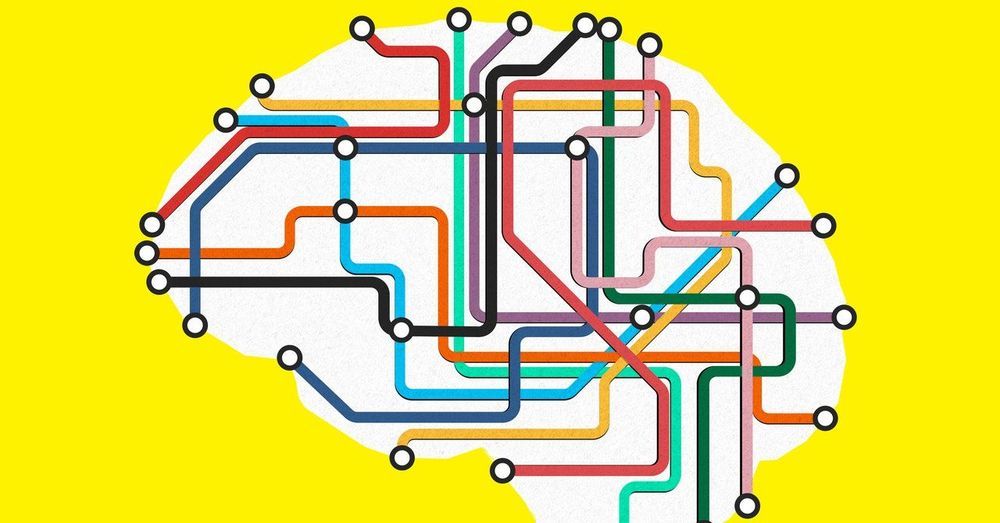Network neuroscience could revolutionize how we understand the brain—and change our approach to neurological and psychiatric disorders.



Individual frequency can be used to specifically influence certain areas of the brain and thus the abilities processed in them — solely by electrical stimulation on the scalp, without any surgical intervention. Scientists at the Max Planck Institute for Human Cognitive and Brain Sciences have now demonstrated this for the first time.
Stroke, Parkinson’s disease and depression — these medical illnesses have one thing in common: they are caused by changes in brain functions. For a long time, research has therefore been conducted into ways of influencing individual brain functions without surgery in order to compensate for these conditions.
Scientists at the Max Planck Institute for Human Cognitive and Brain Sciences in Leipzig have taken a decisive step. They have succeeded in precisely influencing the functioning of a single area of the brain. For a few minutes, they inhibited exactly the area that processes the sense of touch by specifically intervening in its rhythm. As a result, the area that was less networked with other brain regions, its so-called functional connectivity, decreased, and thus also the exchange of information with other brain networks.

A Sound Treatment
Ultrasound is an oddball in the neuromodulation world. Similar to its better-known siblings, such as transcranial direct current stimulation (tDSC) or transcranial magnetic stimulation (TMS), ultrasound changes how neurons fire, which in turn changes their computational output—what we observe as learning, memory, and other behaviors. This idea, dubbed neuromodulation, has taken the neurological world by storm for its near “magical” efficacy for treating people with depression who don’t respond to antidepressants, or people with Parkinson’s disease whose movement patterns are severely disrupted.
Compared to first-generation neuromodulation, where the brain-tweaking gadget is surgically implanted into the brain, ultrasound offers a way to “hack” neural firings from the outside. In a way, the technology uses sound waves to mechanically “shake” the neurons in a circuit back into sequence, so they function in sync as needed and control subsequent outputs like learning, thinking, memory, and decision-making.

#CyberneticSingularity
About 542 million years ago, something weird and profoundly remarkable happened on Earth. Quite suddenly, life went insanely inventive, proliferating from simple, rudimentary single-celled organisms into myriad multi-cellular forms. Evolution discovered the idea of more sophisticated and specialized cells, and most of the basic body plans we know today. Biologists call it the Cambrian explosion.
Today, we are on the verge of yet another event of astronomical significance, akin to some kind of Intelligence Supernova, which I refer to as the Cybernetic Singularity, or the Syntellect Emergence. In the scientific community, this upcoming intelligence explosion is also known as the Technological Singularity. Surprisingly enough, most people are still simply oblivious of this rapidly approaching “galactic event” that so many of us are about to witness in our lifetimes.

Objective reality is merely a pattern that a mind constructs because it provides a useful simplified explanatory scaffolding of the long series of subjectively perceived moments stored in its memory. Needless to say that the Vigner’s Friend experiment mentioned in the article is not the only experimental evidence for the objectivity myth. Think about it when the next time you come across these overloaded terms ‘objective reality’ and ‘objectivity’ — to be precise, they mean ‘intersubjectivity’ instead: Termites would never comprehend chess, for example, this human abstraction lies beyond their species-specific intersubjective mind-network. Apart from inter-species levels of abstractions we should consider psychological, cultural and linguistic differences between individuals of the same species that makes objectivity simply non-existent. Conclusion: we can still use ‘objective reality’, ‘objectivity’ or ‘objectively’ colloquially but we should bear in mind that in a deeper sense these terms are no more than colorful misnomers. https://medium.com/@alexvikoulov/the-objectivity-myth-what-w…b697a5179d
#ObjectivityMyth #ObjectiveReality #ConsensusReality #intersubjectivity #UniversalMind #UniversalConsciousness
“It will remain remarkable, in whatever way our future concepts may develop, that the very study of the external world led to the conclusion that the content of consciousness is the ultimate reality.” –Eugene Wigner
“A neuron in the human brain can never equate the human mind, but this analogy doesn’t hold true for a digital mind, by virtue of its mathematical structure, it may – through evolutionary progression and provided there are no insurmountable evolvability constraints – transcend to the higher-order Syntellect. A mind is a web of patterns fully integrated as a coherent intelligent system; it is a self-generating, self-reflective, self-governing network of sentient components… that evolves, as a rule, by propagating through dimensionality and ascension to ever-higher hierarchical levels of emergent complexity. In this book, the Syntellect emergence is hypothesized to be the next meta-system transition, developmental stage for the human mind – becoming one global mind – that would constitute the quintessence of the looming Cybernetic Singularity.” –Alex M. Vikoulov, The Syntellect Hypothesis https://www.ecstadelic.net/e_news/gearing-for-the-2020-visio…ss-release
#SyntellectHypothesis
Ecstadelic Media Group releases the new 2020 expanded edition of The Syntellect Hypothesis: Five Paradigms of the Mind’s Evolution by Alex M. Vikoulov as eBook and Paperback (Press Release, San Francisco, CA, USA, January 15, 2020 10.20 AM PST)

Named “The Book of the Year” by futurists and academics alike in 2019 and maintaining high rankings in Amazon charts in Cybernetics, Physics of Time, Phenomenology, and Phenomenological Philosophy, it has now been released as The 2020 Expanded New Deluxe Edition (2020e) in eBook and paperback versions. In one volume, the author covers it all: from quantum physics to your experiential reality, from the Big Bang to the Omega Point, from the ‘flow state’ to psychedelics, from ‘Lucy’ to the looming Cybernetic Singularity, from natural algorithms to the operating system of your mind, from geo-engineering to nanotechnology, from anti-aging to immortality technologies, from oligopoly capitalism to Star-Trekonomics, from the Matrix to Universal Mind, from Homo sapiens to Holo syntellectus.

We can’t evolve faster than our language does. Evolution is a linguistic, code-theoretic process. Do yourself a humongous favor, look over these 33 transhumanist neologisms. Here’s a fairly comprehensive glossary of thirty three newly-introduced concepts and terms from “The Syntellect Hypothesis: Five Paradigms of the Mind’s Evolution” by futurist, philosopher and evolutionary cyberneticist Alex M. Vikoulov. In parts written as an academic paper, in parts as a belletristic masterpiece, this recent book is an exceptionally easy read for an intellectual reader — a philosophical treatise that is fine-tuned with apt neologisms readily explained by given definitions and contextually… https://medium.com/@alexvikoulov/33-crucial-terms-every-futu…a1c8b993c8
#evolution #consciousness #futurism #transhumanism #philosophy
“A powerful work! As a transhumanist, I especially loved one of the main ideas of the book that the Syntellect Emergence, merging of us into one Global Mind, constitutes the quintessence of the coming Technological Singularity. The novel conceptual visions of mind-uploading and achieving digital immortality are equally fascinating. The Chrysalis Conjecture as a solution to the Fermi Paradox is mind-bending. I would highly recommend The Syntellect Hypothesis to anyone with transhumanist aspirations and exponential thinking!” -Zoltan Istvan, futurist, author, founder of the U.S. Transhumanist Party
Terms such as ‘Artificial Intelligence’ or ‘Neurotechnology’ were new some time not so long ago. We can’t evolve faster than our language does. Evolution is a linguistic, code-theoretic process. Do yourself a humongous favor, look over these 33 transhumanist neologisms. Here’s a fairly comprehensive glossary of thirty three newly-introduced concepts and terms from “The Syntellect Hypothesis: Five Paradigms of the Mind’s Evolution” by futurist, philosopher and evolutionary cyberneticist Alex M. Vikoulov. In parts written as an academic paper, in parts as a belletristic masterpiece, this recent book is an exceptionally easy read for an intellectual reader — a philosophical treatise that is fine-tuned with apt neologisms readily explained by given definitions and contextually:
AGI Naturalization Protocol, AGI(NP) — initiating AGI (Artificial General Intelligence) via human life simulation training program, infusing AGI with a value system, ethics, morality and generally civilized manners to ensure functioning in the best interests of society as a self-aware agent. Read more: http://www.ecstadelic.net/top-stories/how-to-create-friendly…-explosion #AGINaturalizationProtocol #AGINP
#DigitalPresentism #DTheoryofTime #TemporalMechanics
Temporal philosophy is a fascinating but eerily difficult topic. Correctly answering the philosophical questions and paradoxes of time paves the way to unlocking one of the last remaining mysteries of mind since our perception of time and consciousness, as you know, are simply inseparable. A new theory of time, Digital Presentism, comes from the triangulation of temporal physics, digital physics and experiential realism. This essay addresses the flaming questions in philosophy of time: “Is time fundamental or emergent?”, “How does time exist, if at all?”, “How can we update the current epistemic status of temporal ontology?” For starters, let’s recap what we’ve learned so far about physics of time. Here’s a quick summary: in Time Series essays, we dissected the nature of time through the prism of these 7 common misconceptions:

Behind all this doom and gloom, the current COVID-19 viral threat, dreaded climate disasters and feared robocalypse, it’s hard to see a bigger and amazingly brighter picture. Are we evolving into a new species with hybrid thinking, interlinked into the Global Mind? Once our neocortices are seamlessly connected to the Web, what will that feel like to step up one level above human consciousness to global consciousness? Any crisis, including the current one, is an opportunity to transcend the quagmire of status quo.
Are we evolving into a new species with hybrid thinking, interlinked into the Global Mind? At what point may the Web become self-aware? Once our neocortices are seamlessly connected to the Web, how will that feel like to step up one level above human consciousness to global consciousness?
In his book “The Global Brain” (2000) Howard Bloom argues that hyperconnected humans and machines resemble a lot the neurons of the “global brain,” and the coming Internet of Things (IoT) with trillions of sensors around the planet will become effectively the nervous system of Earth. According to the Gaia hypothesis by James Lovelock, we have always been an integral part of this “Meta-Mind,” collective consciousness, global adaptive and self-regulating system while tapping into vast resources of information pooling and at the same time having a “shared hallucination,” we call reality.